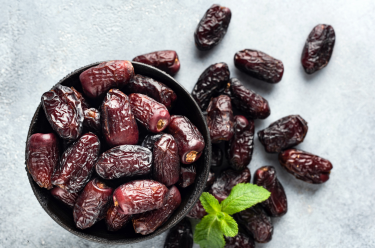When it comes to preparing for childbirth, most expectant mothers dream of a labour that’s as smooth and short as possible. While there are various strategies to help make this dream a reality, one unexpected and simple tip is to incorporate dates into your diet during pregnancy. Yes, those sweet, sticky fruits might just be your new best friend as you approach your due date.
Why Dates?
Dates aren’t just a delicious snack; they offer several benefits that can positively impact your labour and delivery experience:
- Oxytocin-Like Effect: Dates have an effect similar to oxytocin, a hormone that helps stimulate uterine contractions and increase the sensitivity of the uterus, which can aid in a smoother labour process.
- Reduced Postpartum Haemorrhage: The way dates influence uterine contractions can also help in reducing postpartum bleeding.
What the Studies Say
Several studies have investigated the impact of date consumption during pregnancy, and the results are quite promising:
- Study 1: Women who ate six dates a day in the four weeks leading up to their due date were 74% more dilated upon arrival at the hospital, 38% more likely to have their membranes intact, and 21% more likely to go into labour spontaneously. They also experienced a 77% shorter first stage of labour.
- Study 2: Research published in the Journal of Midwifery & Reproductive Health found that women consuming 70-75 grams of dates daily after 37 weeks had a 50% higher Bishop score (a measure of cervical readiness), 43% lower rates of caesarean sections, and 55% less likely to need oxytocin for labour induction.
- Study 3: The Journal of Obstetrics and Gynaecology confirmed these findings, concluding that date consumption during late pregnancy positively affects labour outcomes without adverse effects on mother or baby.
Nutritional Benefits of Dates
Dates aren’t just good for labour; they are packed with nutrients that can support your overall health during pregnancy:
- Natural Sugars: Dates contain fructose, a natural sugar that provides energy without causing blood sugar spikes.
- Fibre: The fibre in dates helps with digestion, and makes bowel motions easier to pass. Fibre also keeps you full, and lowers the risk of gestational diabetes and preeclampsia.
- Potassium: Essential for maintaining fluid balance and regulating blood pressure.
- Magnesium: Supports muscle health and helps with cramps and spasms.
- Folate: Crucial for proper spinal cord development in your baby, reducing the risk of neural tube defects.
- Vitamin K: Important for blood clotting and bone health.
How to Incorporate Dates
For optimal benefits, it’s recommended to start eating dates about three to four weeks before your due date. Aim for 70-75 grams per day. This is roughly equivalent to:
- Six Deglet Noor Dates: These are about 1 inch long.
- Three Medjool Dates: These are larger, about 2 inches long.
If you have concerns about blood sugar levels, speak to your midwife or healthcare provider. It’s wise to monitor your intake early in pregnancy but as long as there are no issues, feel free to a few dates a day from around 36 weeks.
Final Thoughts
Eating dates might just be a simple yet effective way to help make your labour and delivery smoother. Their nutritional benefits, combined with their positive effects on labour, make them a sweet addition to your prenatal diet. As always, it’s a good idea to discuss any dietary changes with your healthcare provider to ensure they fit well with your overall health plan.
So, go ahead and indulge in this natural, sweet treat as you prepare for the big day—your body and your baby might just thank you for it!

